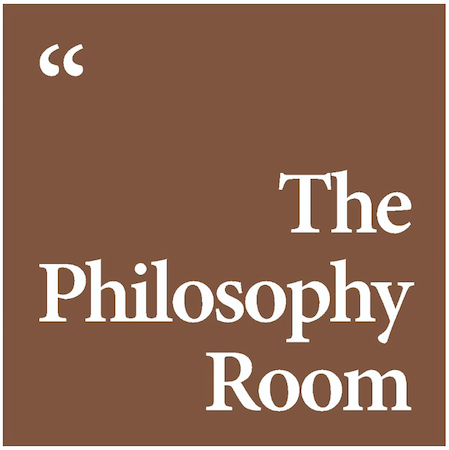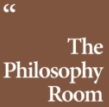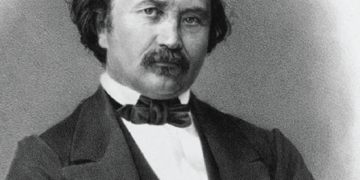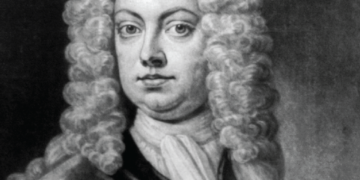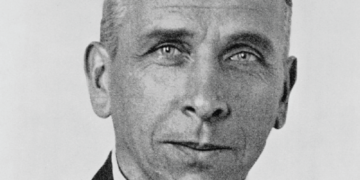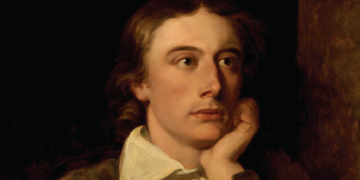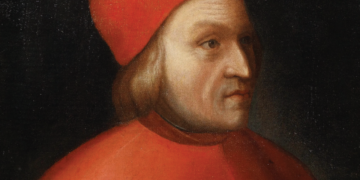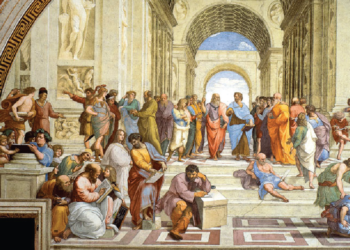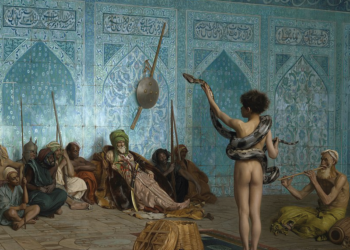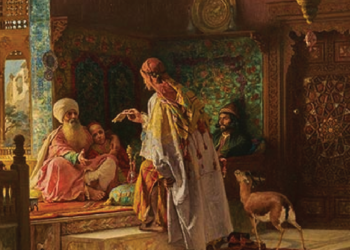Johann Gottfried Herder
1) His Biography
Johann Gottfried Herder was born on 25 August 1744 in Mohrungen, East Prussia (present-day Morąg, Poland), into a modest household. His father was a schoolteacher and cantor, which exposed Herder early to religious teachings and classical literature. Despite his humble origins, Herder displayed a keen intellect and was granted the opportunity to pursue formal education. In 1762, he entered the University of Königsberg, where he came under the influence of Immanuel Kant and developed a strong interest in philosophy, languages, and literature. This period laid the intellectual foundation for many of his later ideas, though he would eventually diverge from Kant’s rationalism.
Herder’s early academic and theological pursuits were shaped not only by Kant but also by the Scottish Enlightenment and French humanist traditions. He became a Lutheran clergyman and, in 1764, took up a teaching position in Riga. While there, he wrote essays and contributed to periodicals, establishing himself as an original thinker. In 1769, he undertook a formative journey across Europe, including a voyage to France, during which he encountered key Enlightenment thinkers and immersed himself in the cultural and philosophical currents of the time.
His travels brought him into contact with the Sturm und Drang (Storm and Stress) movement, a precursor to German Romanticism. One of his most significant relationships during this period was with the young Johann Wolfgang von Goethe, whom he met in Strasbourg. Goethe admired Herder’s intellect and helped him gain a position in Weimar. Their friendship greatly contributed to the development of German literature and philosophy, although it later soured due to personal and ideological differences.
In Weimar, Herder was appointed court preacher and general superintendent, a position he held for much of his life. These years were intellectually productive, yielding some of his most influential works. Herder married Maria Caroline Flachsland, and their partnership was intellectually rich, with Caroline often assisting and inspiring his literary and philosophical activities. During this time, Herder increasingly focused on ideas concerning language, history, culture, and human development, distinguishing himself from Enlightenment universalism with his emphasis on particularity and context.
Herder’s philosophical writings were deeply interdisciplinary, covering aesthetics, theology, linguistics, and political theory. His opposition to the abstract rationalism of the Enlightenment became more pronounced in works like Ideas for the Philosophy of History of Humanity (1784–91), where he advocated a pluralistic view of human cultures and histories. He saw language as central to thought and culture, an idea that would later influence figures such as Wilhelm von Humboldt and the development of hermeneutics.
Throughout his career, Herder maintained a strong belief in the dignity of all human cultures and opposed colonialism and cultural imperialism. His philosophical anthropology placed emphasis on the organic and historical development of societies. He sought to understand humanity not through universal laws, but through the lived experiences and expressions of different peoples. His vision of culture was one of rooted particularity, in stark contrast to the Enlightenment ideal of detached reason.
In the later years of his life, Herder became somewhat isolated intellectually. He distanced himself from Kant’s critical philosophy and clashed with other Weimar intellectuals, including Goethe and Schiller. Nevertheless, he remained prolific, continuing to publish and advocate for his unique blend of historical thinking and humanistic philosophy. His health declined in the early 1800s, and he died on 18 December 1803 in Weimar.
Though his reputation was somewhat eclipsed in the decades following his death, Herder’s influence has since been recognised across numerous disciplines. His ideas prefigured many aspects of modern anthropology, linguistics, hermeneutics, and nationalism. As a thinker who emphasised cultural pluralism and the embeddedness of human understanding, Herder occupies a pivotal position in the transition from Enlightenment rationalism to Romantic historicism.
2) Main Works
Fragments on Recent German Literature (1767–1768)
This early work marked Herder’s entrance into literary criticism. It challenged the dominance of French classicism and called for a uniquely German literature that reflected the spirit and language of its people. Herder argued that literature should arise organically from a nation’s cultural roots rather than imitate foreign models. The Fragments also introduced the idea of historical development in literary forms, foreshadowing his later emphasis on historical context and national character.
Treatise on the Origin of Language (1772)
In this seminal linguistic work, Herder offered a naturalistic and historical account of how language developed among human beings. He argued that language is not a divine gift or a purely rational invention, but a natural extension of human emotional and social needs. Herder posited that the origin of language lies in the human capacity to form symbols based on sensory experience. This treatise was highly influential and became a cornerstone for modern linguistic and anthropological thought.
Oldest Document of the Human Race (1774–76)
This text is a philosophical and theological interpretation of the Genesis creation narrative. Herder sought to reconcile religious tradition with historical and literary analysis, treating the Biblical text as a poetic document that reveals profound truths about the human condition. He argued that scripture should be read as culturally embedded literature rather than rigid dogma, thus aligning biblical hermeneutics with Enlightenment humanism and Romantic historicism.
This Too a Philosophy of History for the Formation of Humanity (1774)
This short but powerful work served as a manifesto against the Enlightenment’s abstract and rationalist view of human development. Herder insisted on a more empathetic, culturally sensitive understanding of historical progress. He advocated for an appreciation of each people’s unique contributions to human civilisation and warned against ethnocentric judgments. It laid the groundwork for his later, more comprehensive work on human history and culture.
Ideas for the Philosophy of the History of Humanity (1784–1791)
This multi-volume work is Herder’s magnum opus. In it, he lays out a sweeping vision of human history as a gradual unfolding of human potential shaped by culture, climate, geography, and language. Herder rejected linear or Eurocentric views of progress, instead promoting a pluralistic and relativistic understanding of civilisations. He championed the dignity of all cultures and was critical of colonialism, arguing that every people has its own spirit (Volksgeist) which must be understood on its own terms.
Letters for the Advancement of Humanity (1793–1797)
This collection of letters serves as a kind of philosophical diary in which Herder addresses a wide range of topics including religion, ethics, politics, and education. The tone is more personal and didactic than in his earlier works. Herder speaks as a humanist concerned with moral progress and spiritual growth, criticising mechanistic views of human beings and arguing instead for a nurturing and holistic vision of human development.
The Spirit of Hebrew Poetry (1782–83)
In this work, Herder explores the poetic and moral qualities of the Hebrew Bible. He admired its metaphorical richness and emotional power, interpreting it not as theological doctrine but as literary expression. Herder’s study helped elevate the cultural and aesthetic appreciation of biblical literature within German intellectual circles. He emphasised the poetic and humanistic values found in ancient texts, thereby contributing to modern biblical criticism and comparative literary studies.
Calligone (1800)
This late polemical work was written in response to Kant’s Critique of the Power of Judgment. Herder disagreed with Kant’s abstract and subjective approach to aesthetics, offering instead a more historically grounded and sensuous theory of beauty. He believed aesthetic experience is rooted in the body and in cultural context, not just in disinterested contemplation. Though not widely read at the time, Calligone remains an important document of aesthetic debate between Enlightenment and Romantic ideals.
3) Main Themes
Cultural Relativism and the Spirit of Nations (Volksgeist)
One of Herder’s most influential ideas is the concept of the Volksgeist, or the spirit of a people. He believed that each nation or cultural group possesses its own unique character, shaped by geography, language, tradition, and historical experience. Rather than viewing history through a universal, Eurocentric lens, Herder emphasised the value and dignity of all cultures in their particularity. This cultural relativism stood in contrast to Enlightenment notions of a single rational standard for progress. He argued that no culture should be judged according to the norms of another, and this idea would later influence Romantic nationalism and the discipline of cultural anthropology.
Language as the Foundation of Thought and Culture
Herder maintained that language is not merely a tool for communication but the very medium through which thought and identity are formed. In his Treatise on the Origin of Language, he challenged rationalist and theological theories of language’s origin by arguing that it emerged naturally from human emotional and social needs. He insisted that each language reflects the worldview of its speakers and that cultural understanding is inseparable from linguistic understanding. This theme would prove foundational to later developments in linguistics, hermeneutics, and semiotics, particularly in the works of Wilhelm von Humboldt and later structuralists.
History as Organic Development
Rather than subscribing to a linear or teleological view of history, Herder saw human development as an organic, non-linear process shaped by environment, culture, and internal striving. His Ideas for the Philosophy of the History of Humanity presents history as a tapestry of multiple civilisations, each developing in its own way. Herder rejected the Enlightenment idea that Europe represented the pinnacle of human progress and instead championed a pluralistic model of historical evolution. He believed history should be studied empathetically and contextually, recognising the internal logic and values of different times and places.
The Unity of Humanity Amidst Cultural Diversity
Despite his insistence on cultural specificity, Herder also maintained a deep humanism. He believed that all people shared a common humanity, even if they expressed it in different cultural forms. This allowed him to argue simultaneously for the uniqueness of cultures and for the moral equality of all humans. His emphasis on compassion, empathy, and understanding across cultural lines reflects his broader ethical commitment to human dignity. This dual vision of unity and diversity made Herder a key figure in both early humanist thought and the philosophical basis of intercultural dialogue.
The Role of Poetry and Art in Human Development
A central concern in Herder’s work is the aesthetic dimension of human life. He believed poetry and art were not luxuries but essential expressions of the human spirit. For Herder, poetry in particular was the voice of a people, expressing collective emotions, traditions, and wisdom. His admiration for oral traditions, folk songs, and biblical poetry stemmed from his belief that such art forms arise from the soul of a culture. This emphasis on the cultural and historical rootedness of aesthetic forms contributed to the rise of Romantic aesthetics and inspired movements to preserve and study folk culture.
Critique of Rationalism and Mechanistic Philosophy
Herder was consistently critical of the abstract rationalism that dominated Enlightenment thought, especially in the philosophies of Descartes and Kant. He argued that such systems ignored the embodied, emotional, and historical dimensions of human life. In his polemic Calligone, he took aim at Kant’s disinterested aesthetics, proposing instead a more sensual, historical, and embodied view of beauty. Herder’s critique extended to metaphysics and epistemology as well, where he rejected universal laws in favour of context-sensitive understanding. This thematic critique foreshadowed later existential and phenomenological reactions against Enlightenment abstraction.
Theological Humanism and Reinterpretation of Scripture
Though a clergyman, Herder’s approach to religion was humanistic and interpretive. He viewed religious texts, especially the Hebrew Bible, not as divine commandments but as poetic expressions of a people’s spiritual experience. In The Spirit of Hebrew Poetry, he analysed scripture as literature, emphasising its emotional depth and moral insight. He believed that faith should not be imposed through dogma but should emerge naturally from an individual’s engagement with the divine through community, history, and personal growth. His theological writings often reflected his broader concerns with moral development and cultural plurality.
4) Herder as a Philosopher
Johann Gottfried Herder occupies a unique and pivotal position in the history of philosophy. Though he is often overlooked in favour of his more systematic contemporaries like Kant or Hegel, Herder’s philosophical contributions are both original and foundational, particularly in the areas of cultural theory, hermeneutics, and historical thought. He resisted the rigid structures of formal philosophy, preferring instead to approach philosophical problems in an interdisciplinary and often literary manner. This fluidity of thought allowed him to traverse fields as diverse as aesthetics, theology, anthropology, and linguistics, making him a polymathic figure who refused to be confined by disciplinary boundaries.
At the heart of Herder’s philosophy lies a profound commitment to understanding the human being in context. Unlike many Enlightenment thinkers who championed abstract reason, Herder believed that human identity is fundamentally shaped by history, culture, and language. He rejected universalist frameworks that imposed singular notions of reason or progress upon all societies. Instead, he proposed a pluralistic vision of humanity, where each culture develops organically according to its own internal principles. This approach anticipated much later philosophical and anthropological work that sought to decentre Eurocentric paradigms and acknowledge the legitimacy of non-Western modes of thought.
Herder’s theory of knowledge and understanding was likewise opposed to Enlightenment rationalism. He believed that thought is rooted in feeling, experience, and language, and that no knowledge is ever purely objective or abstract. This led him to develop early versions of what would later become hermeneutics—the art of interpretation. For Herder, understanding a text, a culture, or a historical period required empathy, imagination, and the effort to enter into the world of the other. His insight that knowledge is historically and linguistically conditioned prefigured the hermeneutic philosophies of Schleiermacher, Dilthey, and ultimately Gadamer.
In political philosophy, Herder expressed scepticism toward both cosmopolitan rationalism and authoritarian nationalism. While he believed in the value of national identity and cultural cohesion, he warned against chauvinism and imperialism. His concept of the Volksgeist—the unique spirit of a people—was intended not to justify dominance but to encourage mutual respect and historical understanding among diverse communities. In this respect, Herder can be seen as a philosophical precursor to both liberal multiculturalism and communitarian political thought, though his legacy has been controversially appropriated by nationalist ideologies that distort his original intentions.
Herder’s aesthetic philosophy also deviated from Enlightenment norms. He did not see art as a domain of universal beauty judged by detached reason, but as an expression of a people’s soul, rooted in historical and environmental particularities. His approach emphasised the emotive and symbolic power of art, especially folk art and oral tradition. He was among the first to argue for the aesthetic worth of non-Western and pre-modern art forms. This inclusive approach laid the groundwork for comparative aesthetics and inspired later efforts in cultural preservation and ethnographic studies.
Theologically, Herder’s views reflect his broader humanistic commitments. He advocated for a religion that nurtures moral growth and spiritual understanding, rather than dogma or institutional authority. He saw divine revelation not as a fixed set of doctrines but as an evolving human response to existential questions, mediated through poetic and cultural forms. This vision aligns closely with Romantic religiosity and anticipates later liberal theology. His interpretation of biblical texts as culturally embedded and metaphorically rich marked a significant departure from orthodox readings.
While Herder was not a systematic philosopher, his influence is profound and wide-ranging. He reshaped the philosophy of history, laid groundwork for modern linguistics, initiated a new cultural consciousness, and contributed significantly to the emergence of hermeneutics and aesthetics. His insistence on the historicity of human life and the embeddedness of thought in culture and language has become a cornerstone of much twentieth- and twenty-first-century philosophy. Herder’s work invites us to approach difference not with abstraction or domination, but with empathy, humility, and the readiness to listen.
5) His Legacy
Johann Gottfried Herder’s legacy spans a remarkable range of disciplines and has had a lasting impact on modern thought. His ideas anticipated key intellectual movements of the nineteenth and twentieth centuries, particularly Romanticism, cultural anthropology, nationalism, and hermeneutics. Though not always acknowledged as centrally as his contemporaries like Kant or Goethe, Herder profoundly influenced the intellectual climate of Europe by reshaping how thinkers understood culture, history, language, and human development. His emphasis on cultural specificity and the inner life of societies helped displace the Enlightenment’s monolithic vision of progress, creating space for more pluralistic and historically sensitive paradigms.
In the realm of cultural and historical studies, Herder is widely recognised as one of the founding figures of modern historicism. He insisted that every people, age, and culture must be understood on its own terms, a principle that shaped the development of both historical scholarship and the emerging discipline of anthropology. His rejection of teleological history and Eurocentrism anticipated later critiques of Western historiography. Herder’s influence is evident in figures like Leopold von Ranke, who developed the principle of presenting history “as it actually happened,” and in modern anthropologists who emphasise cultural relativism and emic perspectives.
Herder’s work on language had a transformative effect on linguistic theory and philosophy. His claim that language shapes thought and reflects the worldview of its speakers paved the way for the linguistic turn in twentieth-century philosophy. Wilhelm von Humboldt, often credited with founding modern linguistics, drew directly on Herder’s insights. Later thinkers such as Benjamin Lee Whorf, Ludwig Wittgenstein, and Hans-Georg Gadamer would also develop ideas closely related to Herder’s vision of the relationship between language, culture, and cognition. This legacy underscores his pivotal role in shaping the hermeneutic tradition.
His ideas on national identity and the Volksgeist significantly influenced the Romantic nationalist movements of the nineteenth century. Herder’s celebration of folk traditions, national languages, and cultural particularity inspired many European national revivals, particularly in Germany, Eastern Europe, and Scandinavia. However, this part of his legacy is ambivalent. While Herder himself advocated for cultural pluralism and warned against imperialism and chauvinism, later nationalists misappropriated his ideas to support exclusionary or even xenophobic ideologies. The tension between Herder’s original intentions and their later distortions remains a subject of scholarly debate.
Herder’s theological and religious thought contributed to the development of liberal theology and biblical criticism. His humanistic and poetic approach to scripture encouraged readers to see the Bible as a cultural and literary document, fostering new forms of interpretation that moved beyond doctrinal rigidity. He promoted a religion grounded in moral development, empathy, and the imaginative understanding of human experience, a stance that had enduring influence on Protestant theology and on thinkers such as Friedrich Schleiermacher.
In aesthetics and literary theory, Herder’s legacy is equally significant. He was among the first to argue for the artistic value of oral traditions, folk poetry, and non-Western art, thereby broadening the canon of what was considered culturally valuable. His work inspired Goethe, the Brothers Grimm, and later literary scholars who sought to understand the deep connections between language, storytelling, and cultural identity. In this way, Herder helped lay the foundation for both comparative literature and ethnopoetics.
Herder’s holistic vision of human development, combining emotion, language, culture, and historical context, resonates strongly with contemporary interdisciplinary approaches in the humanities and social sciences. His work continues to inform debates about cultural diversity, nationalism, cosmopolitanism, and the ethics of interpretation. In an age marked by globalisation and cultural friction, Herder’s insistence on respectful, empathetic engagement with difference remains deeply relevant.
